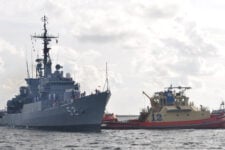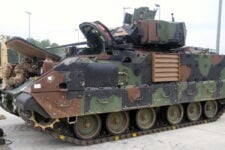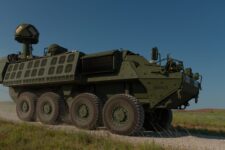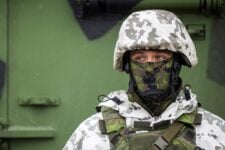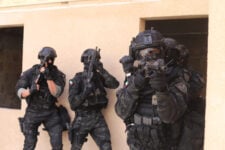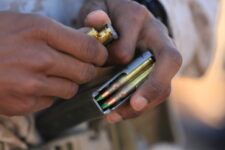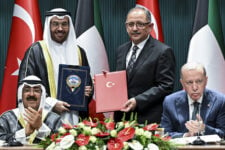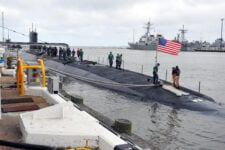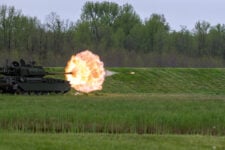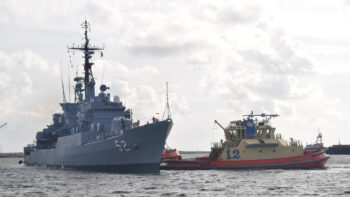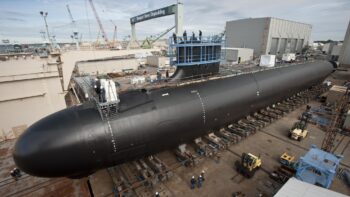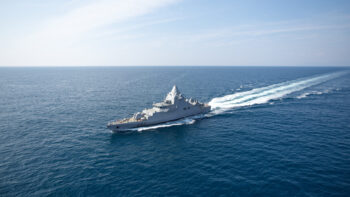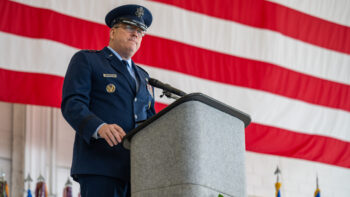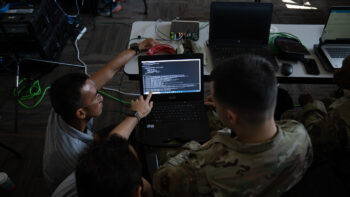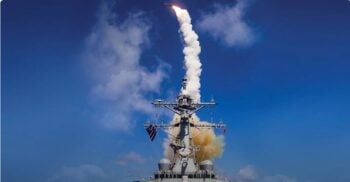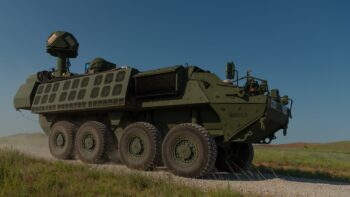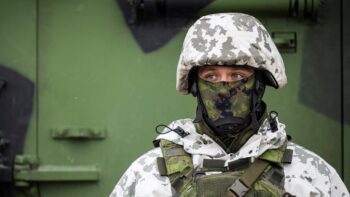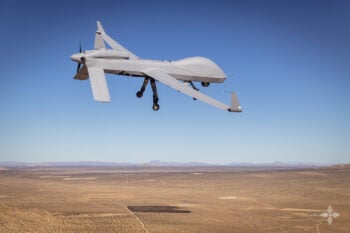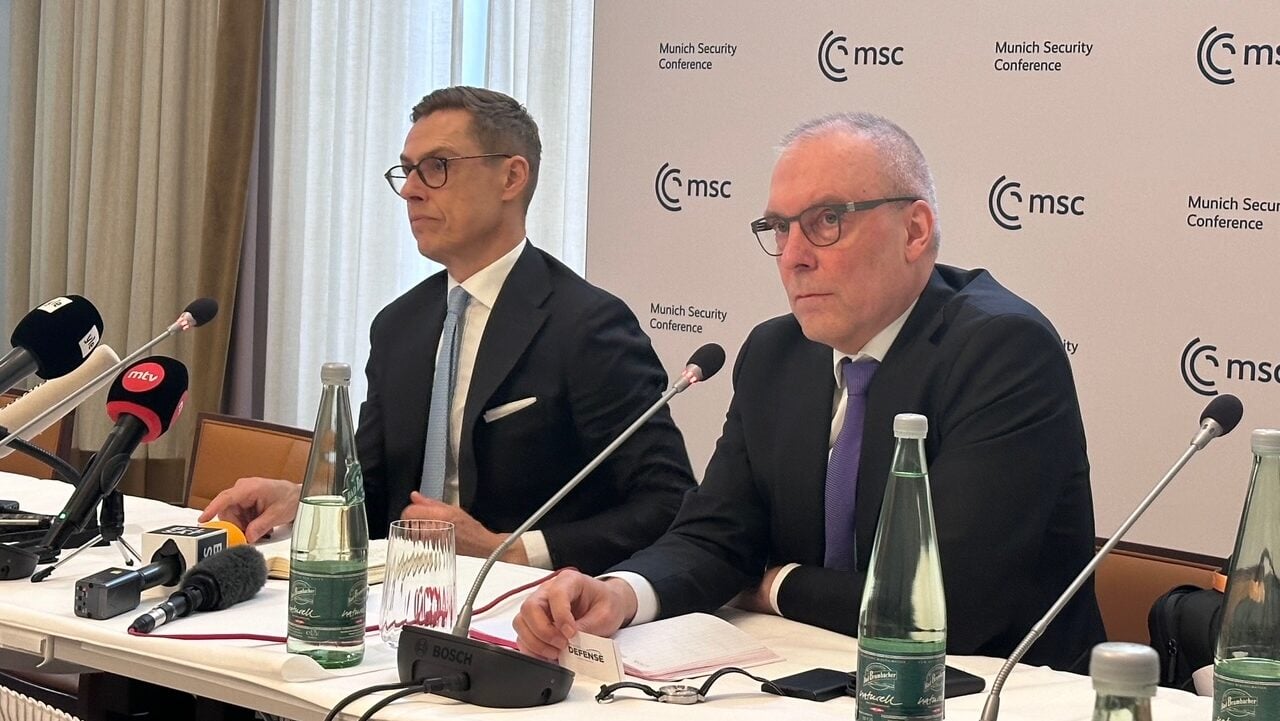
Alexander Stubb, Finland’s President Elect (left) favours China engaging in Ukraine war peace negotiations (Tim Martin/Breaking Defemse)
MUNICH — Finland’s newly elected head of state wants China to play a significant role in to peace negotiations between Ukraine and Russia, a statement unlikely to be welcomed in an increasingly China-focused Washington.
Alexander Stubb, Finland’s President-elect who is set to be inaugurated next month, said during a Munich Security Conference press conference today that he was hopeful Beijing would “get involved” in future peace talks because “they are in the driver’s seat with their relationship with Russia.”
“The problem that we have with peace mediation right now is that it’s too transactional and you have a lot of middle powers doing it and then it doesn’t stick,” said Stubb. He added that a hard border between Russia and Ukraine must be non-negotiable and part of any peace settlement.
Subb’s remarks are not likely to go over well in DC or other parts of Europe which have been increasingly wary of China’s growing global efforts. The comments also appear completely out of step with the official position of Beijing: On Saturday, China’s foreign minister Wang Yi told this conference that conditions are not right to discuss peace talks, reported Bloomberg.
The focus on talks come amid plans led by Ukraine President Volodymr Zelensky to hold a global peace summit in Switzerland in March or April, a summit which will not include participation from Russia, according to Stubb. It remains unclear if China will attend the forthcoming summit or which other major powers will attend, but Stubb also said Zelensky is unlikely to push his previous “10 point plan” and instead “start piecemeal” by addressing a number of key issues.
RELATED: Ukraine advisory group pushes for NATO accession, countering 3 key concerns
Stubb said he expects Moscow will eventually come to the negotiation table, as long as “international pressure” is kept on the regime of President Vladimir Putin.
“I’ll continue to say that the only thing that Putin understands is power. You show any weakness, any soft elements and he will attack,” he explained. “I think once we start moving towards some kind of peace negotiations, we need to understand that you have to be tough with Russia, and especially with Putin, because of course, you know, Russia has signed X amount of agreements with Ukraine, including the border, [agreement] of 1991, [they] did not respect it [and] including another agreement in 1994, [they didn’t respect it.”
Stubb reiterated previous comments that Finland will continue to show calm and composure in dealing with the challenge of how Europe should prepare to finance Ukraine’s war effort, should the US decide to pull funding. Trump, the Republican frontrunner ahead of the November presidential elections, has previously threatened such a scenario. Complicating matters further is a hold up to Washington’s latest $60 billion miliary aid package, which continues to draw concern from European officials.
As troubling as that picture looks for international security, Stubb was dubious about fears that the US would “abandon” Europe and Ukraine’s cause.
To follow through on that approach would “radically” weaken the superpower status of the US, in his view, though he specifically acknowledged that the US is “pivoting” strategically to prioritize fighting a future war against China in the Indo-Pacific.
“I personally think that it’s highly unlikely that the United States, no matter who is elected, would stop supporting Ukraine and the reason is very simple,” he explained. “The transactional cost of that is too high. Doesn’t matter who’s president, he or she will understand that supporting Ukraine in this point in time is crucial for American security interests.”
During her visit to Munich, US Vice President Kamala Harris pledged to continue supporting the war, distancing the Biden administration from any notion the US seeks to employ “isolationism.” But Zelenskyy was critical of a three week House recess, saying “Dictators do not go on vacation.”
Stubb Calls On European Financial Institutions To Change
With the war entering its third full year and Ukraine openly stating its desperation for more munitions, pro-Ukrainian leaders in Europe are scrambling to come up with solutions.
Stubb, a former vice-president of the European Investment Bank, called on global institutions like his former office to “change its statute” so defense industry contractors can “start lumping big orders together.”
“Europe must do something” significant, he said, though he admitted such a move is not a “short term” solution that could deliver a potentially decisive blow to Russia’s invasion. Instead, he said, it fits into a wider approach that rests predominately on “steadfast” support from the West, at both a funding and weapons supply level.
Much like other world leaders and defense analysts, Stubb considered ammunition production “a challenge” across Europe, but he is optimistic that the continent’s industrial base can be better restructured, noting that Ursula Von der Leyen, President of the European Commission, is expected to deliver a policy paper on the subject soon. He didn’t elaborate on details of what that paper may contain.
One other core element of Ukraine’s path to winning the war sits with the roll out of long-term bilateral pacts between Ukraine and European partners and Ukraine receiving EU membership, according to Stubb.
In line with other high ranking NATO member country officials, he was measured on the prospect of Ukraine joining the alliance, but stopped short of suggesting when exactly Kyiv could be invited to the table.
“I think in the long run, NATO membership for Ukraine is what we should strive for and I’m sure that we’ll see language in that direction as we start moving towards the Washington summit in July, so step by step, but I think the direction is quite clear,” said Stubb. “It’s just a question of time.”
He also joined in with Western officials to blame Putin’s regime for the death of Russian opposition leader Navalny in a Russian prison.
“The most significant thing [at the conference] was the murder, the death of Navalny, it is one of those moments you’ll never forget in your life. I would like to send my personal condolences to his family and friends,” Stubb said. “Russia will and shall be held responsible for yet another atrocious political murder.”
With back-to-back deals in Peru, South Korea defense industry expands South American foothold
A new shipbuilding deal could be a test case that, if successful, could lead for years more work and millions more in deals for Seoul, in Peru and South America.
